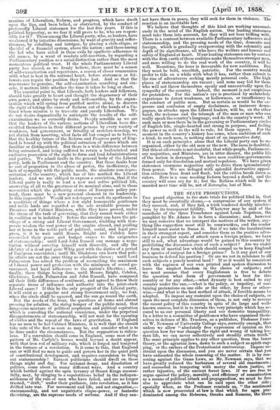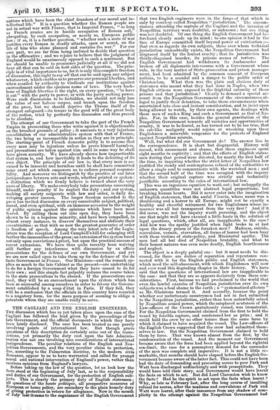THE STATE PROSECUTIONS.
THE grand objection to the state trials for political libel is, that they must be essentially shams,—a compromise of our system if they succeed, and, if they fail, a trick rendered doubly mischie- vous by its transparent futility. Whatever may be said of the manifesto of the three Frenchmen against Louis Napoleon, the pamphlet by Mr. Adams is in form a discussion ; and, however we may conceive that we interpret the motives of the writer, any- thing like suggestion must still be constructive, and the reader himself must assist to frame it. But if we take the luenbrations in their strongest aspect, and consider them as the positive advo- cacy of a peculiar mode of attack upon a foreign prince, we have still to ask, what advantage would be gained to this country by prohibiting the discussion even of such a subject? Are we under any form of martial law which should compel us to keep England as a species of outpost for a foreign prince ? Is it any part of our business to defend his position ? Or are we not in reference to all such subjects a purely neutral land ? If so it would be consistent with the regimen of our own printed and spoken discussion to leave the amplest freedom in the choice of subjects ; and we must assume that every Englishman is free to debate the question what form of government is best for this country or for any other,—what dynasty is best suited to any country under the sun,—what is the policy, or impoliey, of sus- taining pretensions on one side or the other, by force or other- wise,—and what is the best method of attack, if forcible means be adopted. To impose any restraint upon the choice of subjects, or upon the most complete discussion of them, is not only to reverse the recent policy of this country in spite of its large and well- known success, but it is to invade the very principle which has se- cured to us our personal liberty and our domestic tranquillity. In a letter to a committee of gentlemen who have organized them- selves in defence of Mr. Truelove, as a publisher, Professor Fran- cis W. Newman of University College says, correctly enough, that unless we allow "absolutely free expression of opinion on the question how far war changes the right and wrong of taking hu- man life, we can never collectively and steadily attain truth." The same principle applies to any other question, from the lunar theory, or the agrarian laws, down to such a subject as spirit-rap- ping, or the embers of the Protectionist controversy. Impose re- straint upon the discussion, and you are never certain that you have exhausted the whole reasoning of the matter. It is by rea- soning against the Game Laws, as Mr. Newman says, that we have greatly reduced the barbarism of several old enactments ; and succeeded in tempering with mercy the stern justice, or injustice, justice, of the ancient forest laws. If we are free to argue against the Itolicy, morality, and efficiency of assassination as a means of political attack and propagandism, we must be free also to appreciate what can be said upon the other side ; epeoialiy when, as the Professor reminds us, "the sentiment Which is now prosecuted at law is that which for ages pre- dominated among the Hebrews, Greeks and Komans, the three nations which have been the chief founders of our moral and in- tellectual life." It is a question whether the Roman people are not in actual war with France, that is Imperial France, "so long as French armies are in hostile occupation of Roman soil," abrogating, by such occupation, or nearly so, European public law; if so, it is a further question "whether such a state of war justifies every Roman in deadly attacks, open or secret, on the life of him who alone planned and sustains the war." For our own part, we are far from being inclined to decide that question in the affirmative ; and we rejoice to believe that the judgment of England would be unanimously opposed to such a sentiment. But we should be unable to pronounce judicially at all if we did not hear all that can be said on both sides of the question. The prin- ciple is of vital importance to us, for it is only this complete freedom of discussion, this right to say all that can be said upon any subject whatsoever, which enables us to preserve our personal liberties, and when assailed by authority to vindicate our institutions against encroachment under the specious name of laws. The very back- bone of English liberties is the right, on every question, "to have it out" with the party in power, or with the party seeking power. Were such discussions to be forbidden, we should not only lose the value of our habeas corpus, and trench upon the freedom of the press, but we should deprive the Throne itself of its strongest safeguard—its tenure in the good will of the great body- of the nation, tried by perfectly free discussion and thus proved to be absolute.
The attempt of our Government to take the part of the French Empire in prosecuting those who write against it is objectionable on the broadest grounds of policy ; it amounts to a very injurious consolidation of our administrative system with that of }ranee, the two being as incompatible in action as they are in principle. The starting-point of French domestic polity is to assume that every man may be injurious unless he prove himself harmless, and precautions are taken against him until in some way he shall have given security. We have already shown how impracticable that system is, and how inevitably it leads to the defeating of its own Object. The principle of our law is, that every man is as- sumed to be innocent and harmless until he shall have committed some overt act which empowers us to enforce personal responsi- bility. And moreover we distinguish by the practice of our later jurisprudence between acts said words, whether printed or spoken : a distinction which we firmly believe is twined about the very roots of liberty. We make everybody take precautions concerning himself, under penalty if he neglect the duty; • and our system, making all society cooperate with law and order, is daily de- veloping greater success. The larger freedom accorded to the press has invited discussion on every conceivable subject, political, moral, and even spiritual, with an immense accession to the weight of public opinion against the opinions which have been most feared. By calling them out into open day, they have been shown to be in a hopeless minority, and have been compelled, in almost every instance, to disavow themselves and abdicate their eccentricities : so that with us now the greatest guarantee of order is freedom of speech. Among the very latest acts of the Legis- lature was the reception of Lord Campbell's bill for enlarging still further the immunities of the press; an extension of the system based not only upon convictions a priori, but upon the practical success of recent extensions. We have thus quite recently been waiving still further any interference with discussion by ex officio prosodations for the defence of our own Government, and yet we are now called upon to take them up for the defence of the de facto Government in France. Our Ministers—and the remark ap- plies as much to the late Cabinet as the present—are undertaking to do for a foreign Government what they have ceased to do for their own ; and this simple fact palpably reduces the course taken in the state prosecutions to the absurd. If the prosecutions suc- ceed, they will be an encroachment upon the system which has been so successful among ourselves in order to favour the Govern- anent established by a coup d'etat in Paris. If they fail, they will be a confession that the officials in this country have resorted to a nugatory form, for the' mere purpose of seeming to oblige a potentate whom they are unable really to serve.



























 Previous page
Previous page